The Guiding Light
Posted on March 6, 2019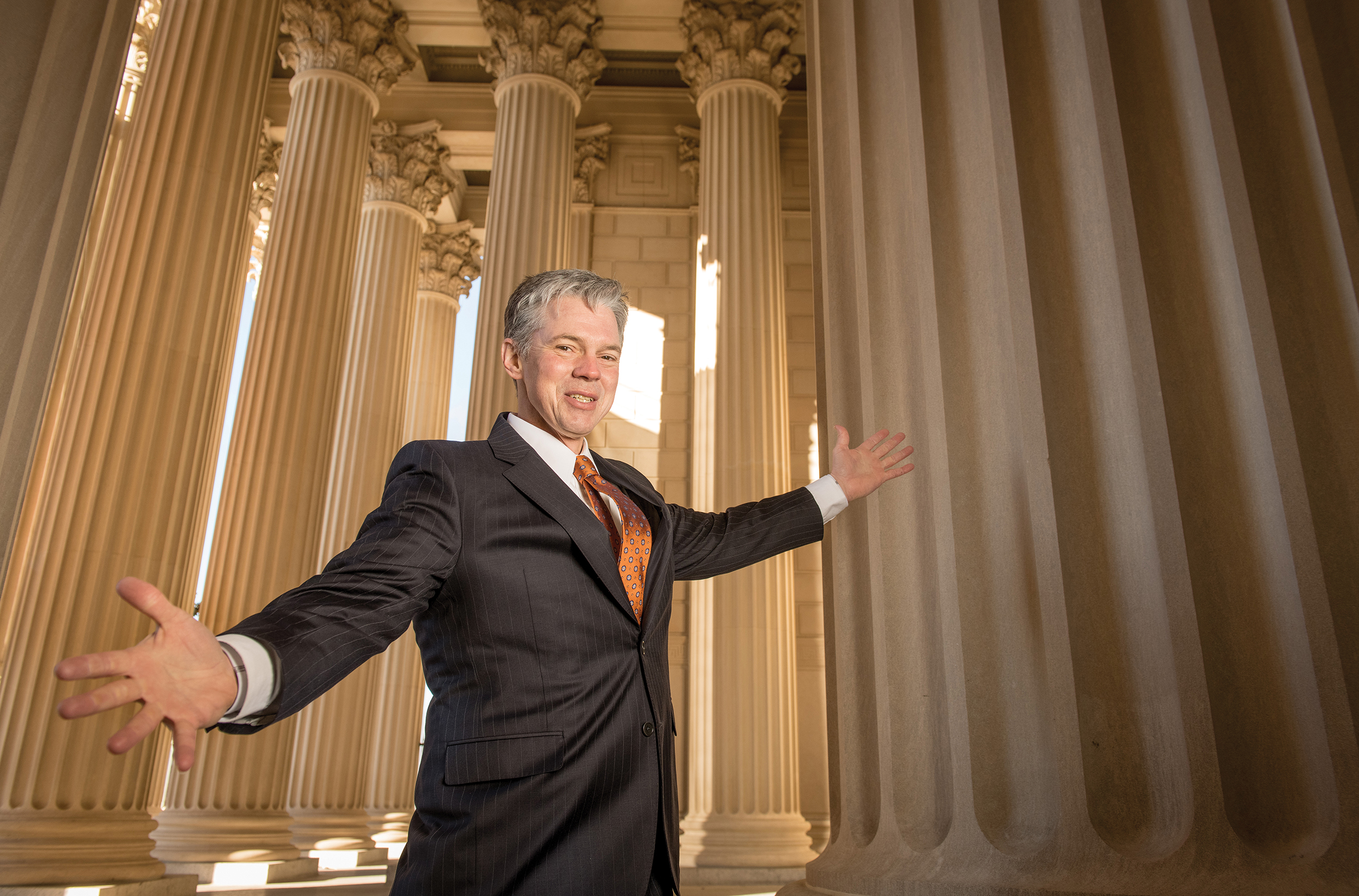
To Sam Anthony ’91, each second counts. Each word matters. And every person he meets is important.(Photo by Sam Kittner ’85)
An irreverent and riveting romp through the nation’s most precious documents is just Sam Anthony’s job. His vocation is stepping over and around devastating obstacles and helping others think about how they would go about that.
by Beth McNichol ’95
In the rotunda of the National Archives in Washington, D.C., beneath a mural in which George Washington dons a cape and white tights “that make him look like a professional wrestler,” Sam Anthony ’91 — special assistant to the archivist of the United States and tour-guide extraordinaire — works his irreverent magic.
“Now, see this guy with a peg leg?” he asks a couple of laconic middle-schoolers while pointing to a depiction of the author of the preamble to the Constitution. “That’s Gouverneur Morris. No — that really was his first name. Goo-ver-ner. Can you imagine? Probably got beaten up a lot in third grade.”
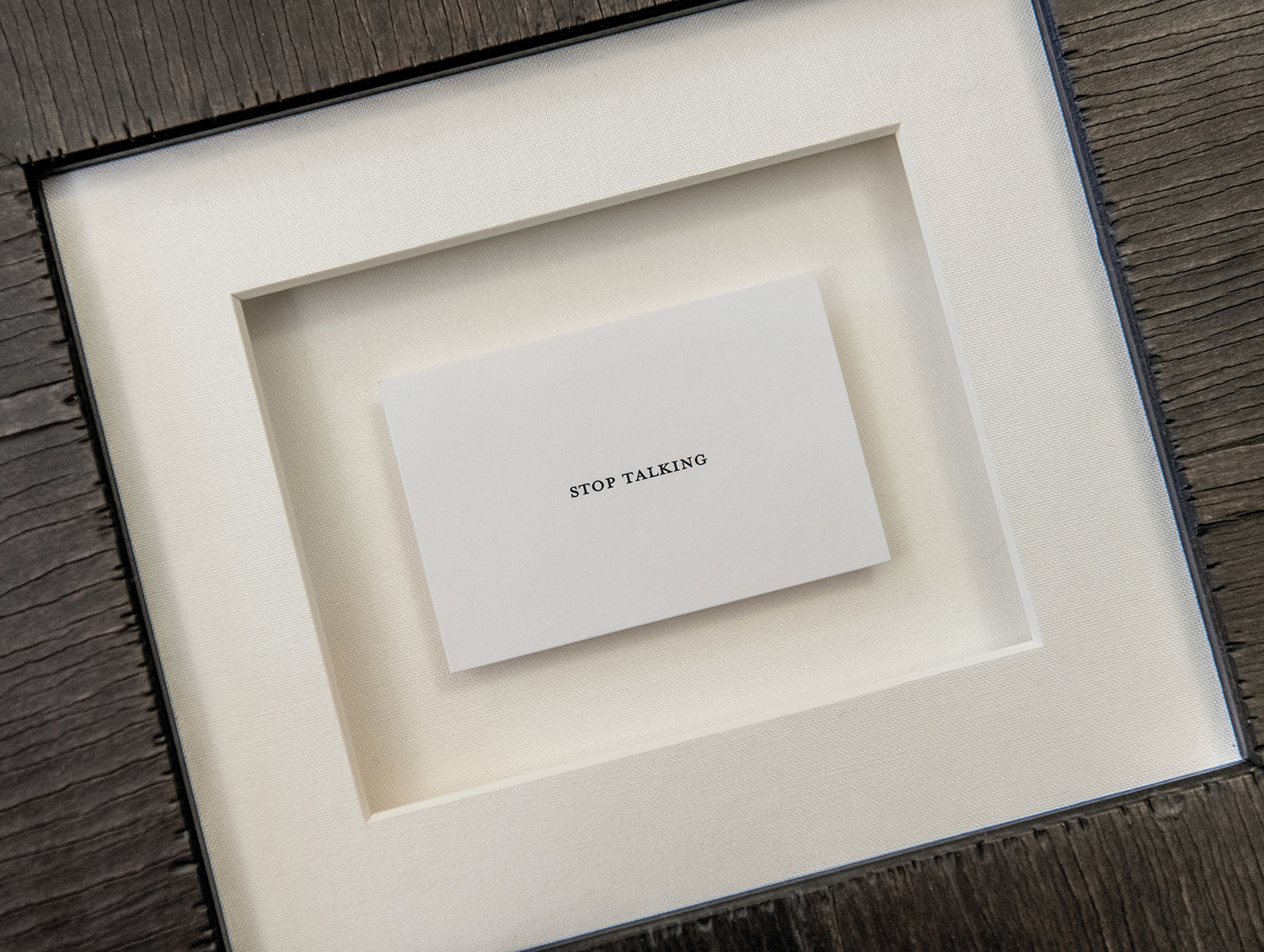
Not infrequently, Anthony’s boss has to admonish him to “Stop Talking.” (Photo by Sam Kittner ’85)
The rotunda is home to the Declaration of Independence, the Constitution, the Bill of Rights and these historical murals. It is beautiful and elegant and awe-inspiring and, for preservation reasons, so dimly lit and cold that you reflexively look around for the light switches and the thermostat. With a 75-foot-high ceiling and bronze doors fit for the Hulk, its size and history inspire a certain etiquette. You want to walk quietly and carry the posture of an 18th-century corset-wearer. You want to tiptoe around as if you’ve stumbled upon a secret.
Unless, that is, you are Sam Anthony. If you’re Anthony, who has worked at the National Archives for 26 years, you never tiptoe. And you certainly don’t stay quiet. That makes him a unicorn in these halls, among the 1 percent of archives employees who like to talk … and talk. Anthony’s boss, David Ferriero, the archivist of the United States and a committed introvert himself, playfully shuts Anthony down during staff meetings by pointing to a sign in his office that says, “Stop talking.”
In a not-so-distant future, Sam Anthony’s voice could become part of the past. Listen to what he has to say in our Hark the Sounds podcast.
While his co-workers isolate themselves in their work each day, Anthony — who also has a master’s degree in library science from the University of Maryland — sends emails inviting them to fitness boot camps he’s organized. He hauls in puppies to encourage pet adoption and lure introverts away from their desks. He volunteers for every task, every time.
“Sometimes,” said Ferriero, “it feels like he’s the ship’s social director.”
But no one at the archives, from Ferriero to the security guards, takes Anthony for granted. They are all too aware that, in a not-so-distant future, Anthony’s voice could become part of the past.
Since 2004, he has been fighting an oral squamous cell carcinoma his doctors have described as “smoldering”; it has slow-burned to five recurrences since, the latest in 2016. Each time it returns, surgeons remove another part of his tongue or a sliver of the floor of his mouth, which has left him with a speech impediment. Each time he goes into surgery, he doesn’t know if he’ll be able to talk at all — or even to eat — when he wakes. And because of these facts, Anthony has designed a life that is anything but a stodgy mural frozen in time; it’s a place where founding fathers wear Lululemon tights. A place where he hopes to take people away from “the absurdity of life, bureaucracy and traffic” for a little while.
To Anthony, each second counts. Each word matters. And every person he meets is important.
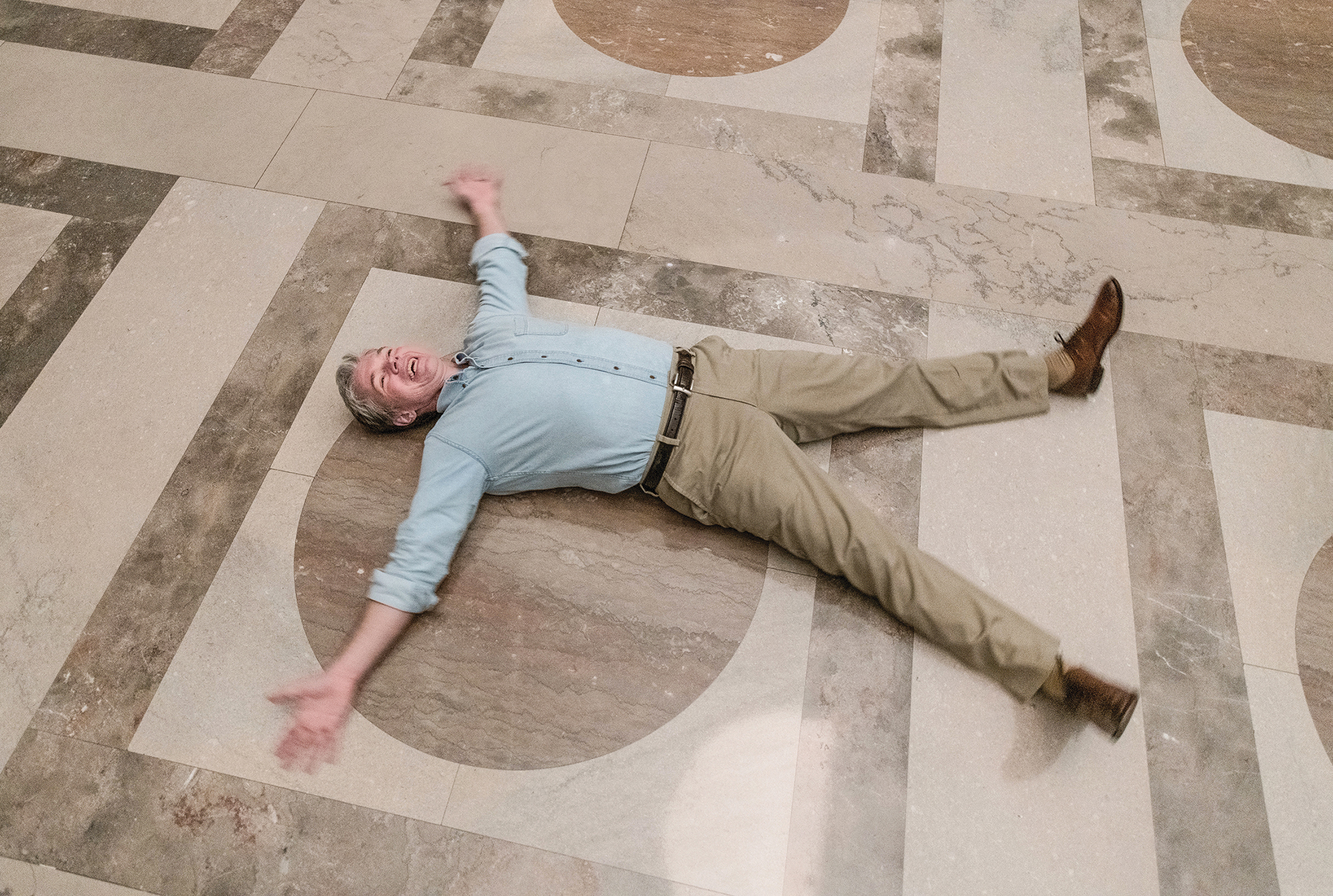
The tour guide extraordinaire invites kids to join him on the rotunda floor for the best view. His own reverence for the place and the objects is not in question. (Photo by Sam Kittner ’85)
That includes these middle-schoolers on his tour — who are even harder to budge than some Russian military officers he’s met. Undeterred, Anthony lays himself down in a suit and tie on the archives’ cold marble floor beneath Washington’s gaze. And he starts doing snow angels. Marble angels. He muses about all the other 13-year-olds who have walked on this very surface since 1935. The sight of this 49-year-old man lying on this fancy floor defies all the rules of public decorum that have been drilled into these adolescents since preschool. After all, tour guides are supposed to tell kids they can’t do things like this. Here’s Anthony, showing them what they might miss if they don’t.
“You have to come down here and see what this is like,” he implores them — and they do, giving in to his charm while gazing at the limestone octagons that decorate the dome, where the light is brighter than all the history around them.
“You really get a different perspective of this room from down here,” Anthony tells them. Then, he unleashes his inner Robert Downey Jr., his rapid-fire wit.
“Also, you learn that, if you’re going to sleep here, bring a sleeping bag for sure — but for heaven’s sake, also bring an air mattress. You’re going to need some padding.”
Cancer can magnify the darkness and light we all walk around with — the electricity that fuels a good day with our kids, and the bottom floor of our souls where we struggle with all that we are and all that we could be. The forces are always competing. But the crazy, beautiful thing about Sam Anthony is that he finds a way to let the light win.
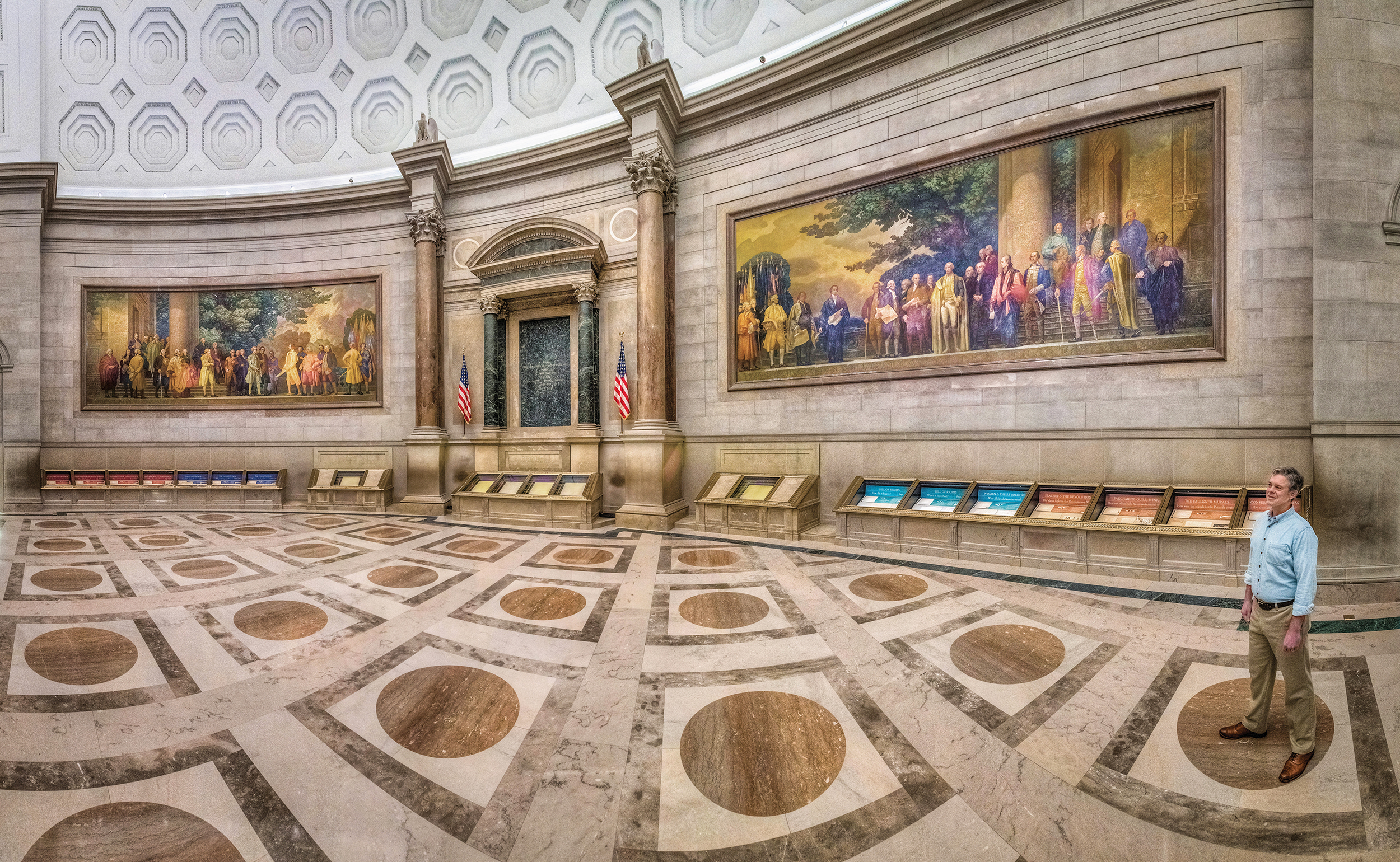
Right here in the presence of the Declaration, the Constitution and the Bill, Anthony’s narration covers George Washington in cape and white tights “that make him look like a professional wrestler.” (Photo by Sam Kittner ’85)
‘Or I could find a way’
Anthony loved history from the moment Carolina Professor W. James McCoy told the story of Alexander the Great’s troops performing synchronized maneuvers using their sarissas, or spears, to intimidate their foes.
McCoy had demonstrated the routine for his students: “Sarissa left, sarissa right, twirl sarissa.” Anthony still giggles when he thinks about it. The stories his professors told, and how they told them, vibrated with the twists and turns of a thriller. That was how an extrovert wound up working at the National Archives, the neoclassical temple of American democracy. Eventually, he found his way out of the research rooms and into a more natural habitat: in front of C-SPAN cameras, hosting more than 500 events as director of the archives’ author lecture program.
And then a stinging sip of carbonated water changed everything. At 35, Anthony suddenly was eyeing his own twists and turns inside a hospital room. He woke from that first surgery with a fierce pain in his throat. While he had slept, his wife, Sharon, had learned that the cancer had been more aggressive than they thought, Stage IV, reaching the lymph nodes in his neck. Surgeons had removed a third of his tongue.
Then came the hard part: Daily radiation and three chemotherapy treatments over nine weeks. Meals were painful, and his taste buds, burned by radiation, failed him; everything felt like cotton in his mouth. He stopped eating solid food for 21 days and lost 40 pounds.
“I remember one of the radiologists said, ‘Once we stop treatment, you’ll improve. Hang on,’ ” Anthony said. “And that carried over to me. Because I’m realizing that I have a lesson: How do you out-endure whatever is bothering you? How was I going to out-endure this pain? I was in bed, but could be awake, 20 hours a day.”
He recalled a lecture series he had hosted on Vietnam prisoners of war, how they “would do things mentally to keep themselves sharp. Like one guy talked about re-creating Star Trek episodes in his head. When you have nothing but your mind because your body’s crap, what are you gonna do to keep from going nuts?”
Anthony made lists — of favorite songs from seventh grade, and then eighth. Of people he knew in third grade, then fourth. When he was feeling well enough, he’d call up some of the people on those lists — kids he played Little League soccer with in Wilmington and even his old high school coach, just to say hi, or thank you, or let’s keep in touch.
“I realized I could complain about it and get bitter and point my finger and blame someone else. Or I could find a way to get around it. And I didn’t want to be that bitter, angry person in the world because it’s all going to end soon. Let’s make it count for something.”
— Sam Anthony ‘91
“I realized I could complain about it and get bitter and point my finger and blame someone else,” Anthony said. “Or I could find a way to get around it. And I didn’t want to be that bitter, angry person in the world because it’s all going to end soon. Let’s make it count for something.”
One thing Anthony didn’t need to worry about was his place at the archives. As he lay recovering from surgery, Allen Weinstein, the newly appointed archivist of the United States, who knew and respected Anthony from his work with the author lecture series, sent him a note.
“Take all the time you need to recover,” Weinstein had told him. “When you return, you can have your old job back, or you can come work for me.”
Anthony was filled with not only relief and gratitude but excitement. This new challenge, as one of two of Weinstein’s special assistants, would become the perfect job for him, a forward-facing position in which he could both research history for VIPs and share it with them and the public through tours.
Three years later, Weinstein resigned from the archives and took an academic position at the University of Maryland; however, as an article in The Daily Beast reported last fall, Weinstein, who died in 2015 from Parkinson’s disease, had been investigated for sexual assault before his departure. It had fallen to Anthony to report the accusation against Weinstein to higher-ups in the federal government, which triggered an investigation and Weinstein’s resignation.
“When the call came through from a former colleague of mine saying, you know, ‘I was assaulted by the archivist,’ I got a pit in my stomach,” Anthony said. “But I realized I needed to make a call. But … it was tough.”
Anthony stayed in his position following Weinstein’s departure, having shown a knack for connecting the agency’s mission to its high-profile visitors — and to himself. He riffed with rock stars about the history of the Fender guitar and discovered a sentimental document to give to Prince Charles when the future king visited. He looked around at the archives’ vast holdings and saw courage and vulnerability everywhere: Jackie Robinson writing to president after president in support of civil rights; Susan B. Anthony fighting to give women the vote. Gen. Dwight D. Eisenhower — his usually steely nerves frayed — misdating the handwritten draft of his in-case-of-defeat letter on D-Day. All human, all like him.
In 2010, when his cancer returned for a third time, robbing him of energy, Anthony drew from all that courage by joining a local crew team. He had never rowed in his life; to begin such a strenuous sport at age 40 — and then compete in it — was unusual enough without the challenges of a serious illness. By then, he understood that the tumors would continue to reappear, that the chemotherapy and radiation had not worked five years earlier; but he viewed crew as the perfect antidote to his fatigue: The stronger he could make his body, the more intimidated his cancer would be by his fighting skills when it returned.
Sarissa left, sarissa right, twirl sarissa.
“I think about what Captain Kirk said. He said, ‘I can offer only one small piece of advice, for whatever it’s worth: Use every scrap of knowledge and logic you have to save the ship ….’ How can I use a scrap from my rowing to help me with cancer? How can I use this thing from work to help with my fear? I use every scrap I can to make my life better.”
Think about your life
Over the years, as Anthony met with college students who’ve visited the archives, he noticed an anxiety circling around them. He realized that you didn’t have to face life-threatening challenges to feel great unease. Sometimes, all you had to be was a twenty-something without a roadmap, trying to sort out your future.
He shared his history with the students, all the good and a lot of the bad. He gave them advice on how to out-endure uncertainty, drawn from his bedridden hours: Make lists, he said, of all the skills you’ve acquired since you were a child. Of all the adults who can tell you about your strengths. Of all the things you’ve ever dreamed of being — whether an astronaut or an alligator. And then use those lists to figure out what your time on earth should look like.
“It’s OK to think about your career,” Anthony told them, “but you have to go a little further. You need to think about your life.”
He’s amassed a quiet fan club among those who’ve heard his story, populated by people who have said things like, “I truly believe he changed my life that day.”
Katie Thore ’15, a GAA staff member who first saw Anthony’s act while an undergraduate and returned last year to show it to friends, said she realized after hearing Anthony’s story that you don’t have to be an executive to have a good life. An extraordinary life doesn’t depend on an impressive title and salary; it depends on matching the expanse of your inner world to the actions you take outside it.
“I think about what Captain Kirk said. He said, ‘I can offer only one small piece of advice, for whatever it’s worth: Use every scrap of knowledge and logic you have to save the ship ….’ How can I use a scrap from my rowing to help me with cancer? How can I use this thing from work to help with my fear? I use every scrap I can to make my life better.”
— Sam Anthony
“Sam has the job that we all have,” Thore said, “but he makes everything more meaningful.”
Alex DelSordo, Anthony’s rowing coach, said he was struck by how hard Anthony works to make others feel successful. He’s such an anomaly, DelSordo said, that you’re tempted to wonder “what his angle is.”
“The fact is,” DelSordo said, “because Sam almost died, and because he experienced what he did, there is no angle with this guy. He doesn’t accept life for what it is. He tries to make it better for himself and for other people around him. He’s taught me that selflessness is essential in life. I learned that less from going to church every Sunday than I did from him.”
Miriam Kleiman, the archives’ program director for public affairs, once called Anthony for help with an exhibit she was curating on Holocaust survivors who had found refuge in the United States. Sam was in his car, driving to Johns Hopkins for a biopsy. Though she insisted that they speak later, Anthony would have none of it. By the time Anthony reached his appointment, Kleiman had a solution to her quandary — one that led to the father of a childhood friend sharing his refugee story with hundreds.
“That’s Sam,” Kleiman said, “on his way to a biopsy.”
Anthony doesn’t want to be sainted, let’s get that straight. He hears Kleiman tell her story, and it makes him a little uncomfortable; he’s quick to quip that he was driving one-handed and speeding when she called. And then he insists that he can be pretty self-centered.
“I’ve seen the Declaration a lot of times,” he said. “But to see it through your eyes or to see it through your kids’ eyes, the wonder of it, the excitement … maybe I’ll get something new out of it that I didn’t before. And see, then — I’m winning. In a way, it’s kind of selfish.”
This is gonna end
The past few years have been some of Anthony’s most challenging. His most recent surgery, in 2016, also involved repairing his jawbone, which had receded from radiation therapy 10 years earlier. For four weeks before and four weeks after the operation, he spent two hours a day inside an oxygen-rich hyperbaric chamber to help repair the bone.
But later that year, as it so often does for Anthony, perspective arrived.
In December, Anthony designed a tour for a 10-year old history buff and cancer patient named Logan, whose wishes included seeing the Declaration of Independence. Logan was too sick to make the trip from Massachusetts, so he watched a live feed from his bed as Anthony worked his magic in the rotunda.
Anthony couldn’t see Logan as he worked through his tour, couldn’t tell if he was connecting, couldn’t inhabit Logan’s space with anything other than his own truth. So, pausing at Article V of the Constitution, which acknowledges the need to amend, that’s precisely what Anthony did.
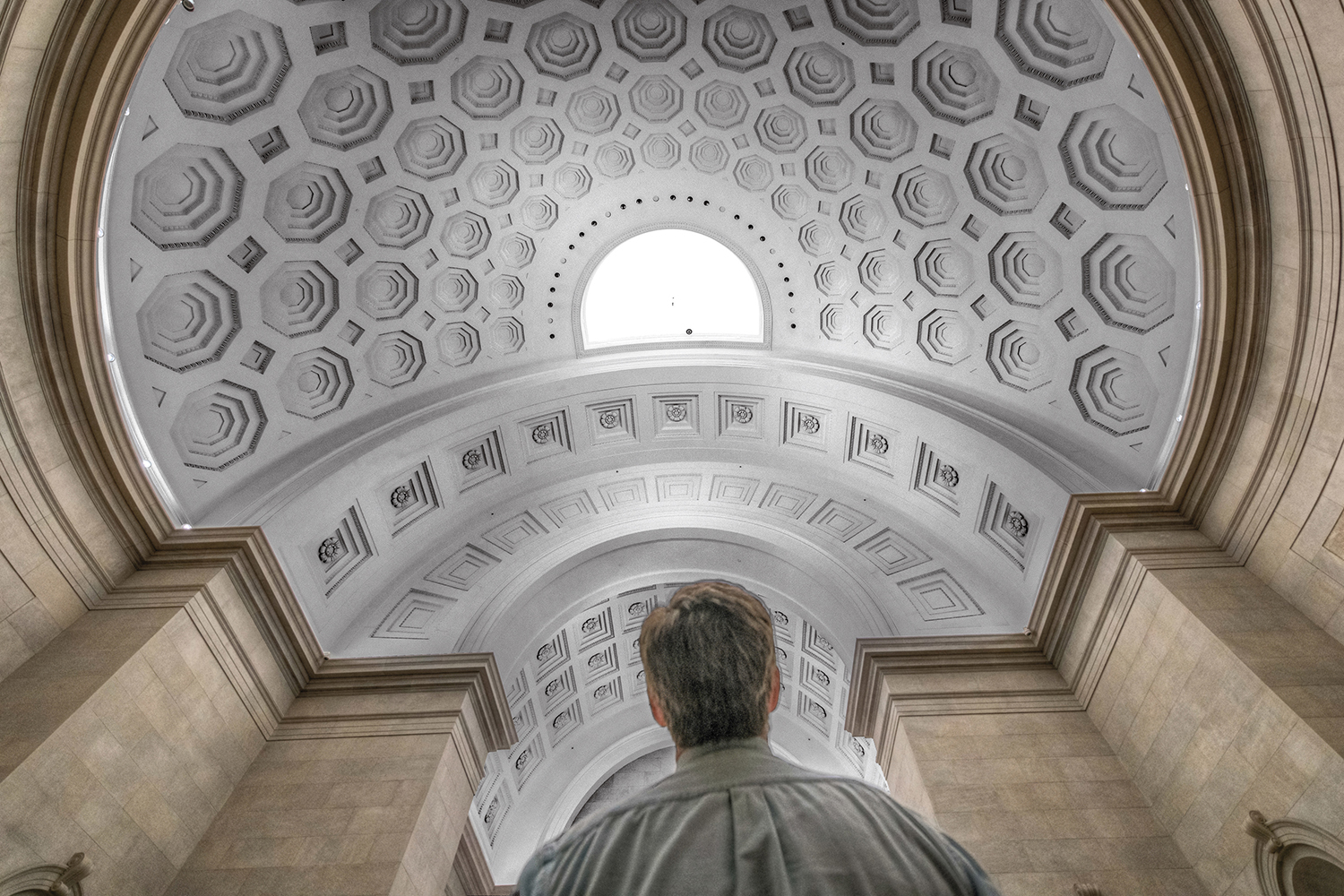
The crazy, beautiful thing about Sam Anthony is that he finds a way to let the light win. (Photo by Sam Kittner ’85)
“I gotta tell you, Logan, change is essential in life,” he said. “When I was diagnosed with cancer 11 years ago, I felt pretty sorry for myself. I felt scared, and I felt angry. But then I thought: I’ve got to change the way I think. … ‘Maybe there’s a chance. I can survive. And with what time I do have, I’ll make the most of my life.’ And since then, I’ve had six surgeries, I’ve had chemotherapy, I’ve had radiation. I kind of talk funny, because they keep cutting pieces of my mouth out of me. About a third of my tongue is missing. But I’ve changed. I’ve learned how to talk. I’ve learned how to keep cool and keep calm and not get too scared. And I’ve learned to make every day special. And I gotta tell you, buddy, today is the highlight of my life — to be here with you right now, talking about these documents, is way beyond cool.”
At the end of the tour, a co-worker handed Anthony a phone, where he could see Logan on video call, saying the words “thank you” with great effort. “Hey, buddy,” said Anthony, choking up, “my pleasure. Call back anytime.”
Logan died two months later.
For all of his bursts of optimism and wit — even his doctors get a taste of it, when he asks before each surgery if they’ve had anything to drink that day — Anthony can become grave. When he speaks with raw honesty about the disease that he out-endures each minute, his boyish face shifts. He spreads his palms on the table in front of him, gathering the truth he needs to share.
“I’ve talked your ears off right now, and you’ve been very polite,” he says. “But the thing is: One day, I’m not gonna be able to. I’m preparing myself for that. … I’ve had six surgeries. I don’t think it’s gonna stop unless medical technology changes. So, what I am fully aware of as I’ve talked to you is that, this is gonna end. The speech is going to get worse. You’re looking at me right now, and you’re being very kind, but I can hear it. It’s gonna end.
“So,” he says, his voice clear as a bell in this moment, “listen to it while I can.”
What items go into our own archives? Big things too often get the most billing — our jobs, our degrees, our milestones. But it’s the smaller moments — the Captain Kirk scraps — that become the true arteries of any lifetime. It’s the marble angels that we choose to do, sweeping ourselves to a new perspective. It’s Sam Anthony, showing us how to be a little more extraordinary in the ordinary moments.
Beth McNichol ’95, a freelance writer based in Raleigh, is a former associate editor for the Review.
Thanks for reading the Carolina Alumni Review
Carolina Alumni members, sign in to continue reading.
Not yet a member? Become one today.
